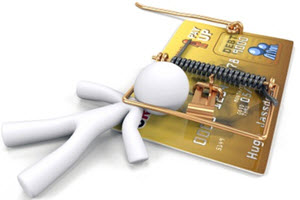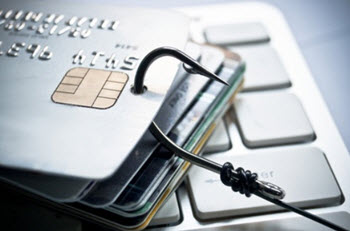Having and using a credit card can come with many benefits – such as cash backs, building credit history and getting complimentary insurance policies – but there are also quite a few pitfalls to avoid. Below, we have listed a few important ones.
Overspending
 Having access to credit means that it is possible to overspend. It is so easy to put something on the card and not really think about how you will be able to pay it off.
Having access to credit means that it is possible to overspend. It is so easy to put something on the card and not really think about how you will be able to pay it off.
Using a credit card can be really low-cost if you pay the bill in full each month. If you on the other hand start carrying a balance, the interest rates can be huge, and may make it difficult for you to pay down the principal since you will be busy paying the interest.
If you need to put something on your credit card that you can not pay off completely when next bill comes, carefully calculate what it will cost you in interest rates. Is it worth it? Can you afford it? Is this the best credit option available to you?
Not understanding compound interest
Don’t get a credit card until you understand compound interest and how it will impact your budget. Compound interest is a blessing in your savings account and hell for your credit card balance.
Costly cash advances
Before you sign-up for a credit card, make sure you know exactly what a cash advance will cost you and if you will start paying interest right away.
- Is there a fixed fee on the cash advance?
- Is there a percentage fee on the cash advance?
- When will I start paying interest on the cash advance?
There are many credit cards that won’t charge you any interest on purchases if you pay the bill in full each month, but that will charge you interest on any cash withdrawal from the day of the withdrawal. This means that even if you pay your bill in full as soon as it arrives, you still have to pay some interest on that cash advance.
You might want to find another, cheaper, solution for the ATM, such as an ordinary debit card.
Unnecessary annual fees
 Take a look at your financial situation and spending habits. Is paying a large annual fee for your credit card really worth it? In some situations, the answer will be YES, it is worth it, because with this specific card, I’m getting such a big cash-back on gas, I get that comprhensive free travel insurance I really need, and so on. In other situations, you might find out that you are just throwing away money on an annual fee without actually reaping any of the benefits of the expensive credit card. Be honest with yourself. Is this actually the best card for you, or do you just like the prestige factor associated with this credit card?
Take a look at your financial situation and spending habits. Is paying a large annual fee for your credit card really worth it? In some situations, the answer will be YES, it is worth it, because with this specific card, I’m getting such a big cash-back on gas, I get that comprhensive free travel insurance I really need, and so on. In other situations, you might find out that you are just throwing away money on an annual fee without actually reaping any of the benefits of the expensive credit card. Be honest with yourself. Is this actually the best card for you, or do you just like the prestige factor associated with this credit card?
Utilizing a lot of your available credit
Having used more than 1/3 or your available credit can look bad on your credit report. In the United States, even using just 30% of your unsecured revolving credit (credit cards and similar) is likely to cause your credit score to drop.
Example 1: You have a VISA with a $1,200 credit limit. If you owe $360 or more, your credit utilization ratio has reached 30% or more and this may negatively impact your credit score. If you on the other hand owe less than $120, it can have a positive impact on your credit score. Owing 10% – 29% will be seen as neutral by most credit score algorithms.
Utilizing a lot of your available credit can decrease your creditworthiness even if you are a super responsible person that’s never late with a payment, so be careful with this pitfall.
Not picking the most suitable credit card for YOU
Take a look at your current needs and spending habits and pick the credit card that is suitable for you, right now. If you manage your credit well, you can always get another credit card later if your life circumstances changes.
A common pitfall with credit cards is to engage in wishful thinking and get the credit card that is best for our dream life and not for our real life. Yes, CreditCard A comes with great travel insurance abroad and frequent flier perks, but are you likely to reap any of these benefits soon? You will be car commuting to Raleigh for at least two years and using most of your disposable income to pay down student loans rather than travel the world, so maybe  CreditCard B with the great year round cash-back for gas is a better choice right now? Use the cash-back to pay down the student loans quicker, and you will be closer to actually going on that European vacation instead of just dreaming about it while swiping CreditCard A at the gas station.
CreditCard B with the great year round cash-back for gas is a better choice right now? Use the cash-back to pay down the student loans quicker, and you will be closer to actually going on that European vacation instead of just dreaming about it while swiping CreditCard A at the gas station.
Another common pitfall is not considering whether you might be able to get a more beneficial foreign credit card with lower interest rates. Some countries such as Norway have rules that allows some foreign citizens to get Norwegian credit cards. This can be very beneficial since Norwegian interest rates are rather low.
Not using the card
“I have a credit card but I will only use if for emergencies.”
You have probably heard this line before, and the person saying it will seem both smart and prudent. Pay cash and don’t go into debt unless its absolutely necessary, right?
The truth is, in may countries, such as the United States, you need to use credit to increase your creditworthiness. We can argue about the pros and cons of a system like that, but in the end of the day, a person who never use credit will not have much of a credit history to show prospective lenders when applying for a home mortgage loan.
Of course, this doesn’t mean that you must carry a balance and pay interest on your credit card. Simply use the credit card to pay for a few necessary expenses each month, and set money aside to make sure that you can pay the credit card bill in full when it arrives. You will build credit history without wasting money or going into a debt spiral.
It should be said that a credit card isn’t the only way to build credit history. You can have student loans, auto loan, installments, and so on. But having a well-managed credit card or some other revolving credit in your credit history will show that you are responsible enough to handle this type of easy-access credit. Ideally, your credit history should include a few different types of credit, e.g. both revolving credit and installments.